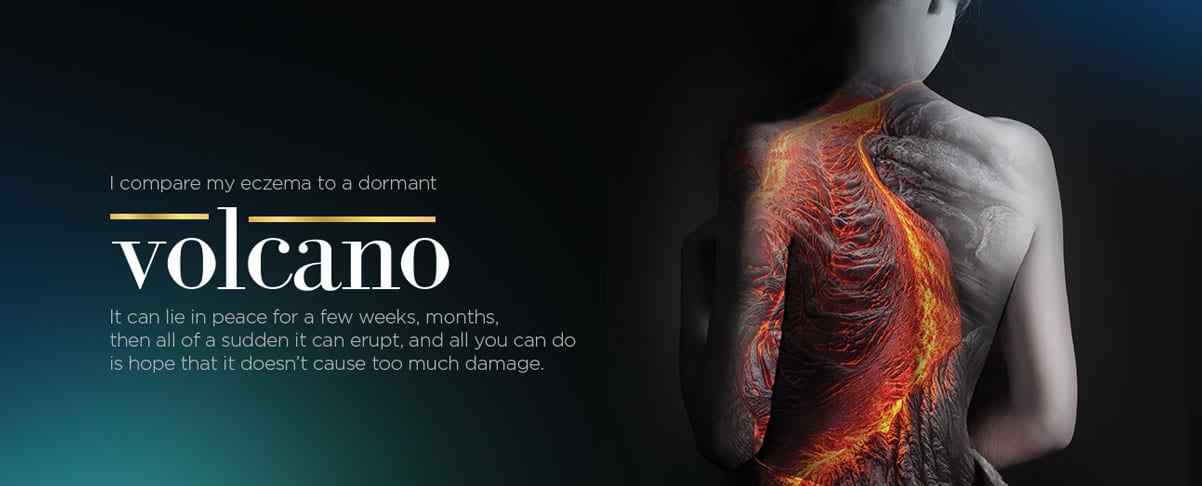Eczema and Chronic Urticaria: Say Goodbye to Messy Creams and Steroids, Say Hello to Ketotifen

With the skin being the largest and most visible organ of the human body, ongoing problems with the skin can be all-out life-changing, and in some cases, even devastating. Eczema and chronic urticaria (hives) are two examples of skin conditions that can bring about a litany of ongoing challenges, including skin discomfort and problems with self-esteem.
Eczema may affect as many as 15 million people in the U.S. at some point in their lifetimes, even though most people experience the issue during childhood. Chronic urticaria is thought to affect as much as one percent of the global population. From unsightly redness and inflammation to uncomfortable itching and burning, both eczema and hives can be difficult skin problems to deal with and treat.
Eczema, which is usually medically referred to as atopic dermatitis, is a skin disorder that seems to damage the primary skin barrier. Even though eczema is not necessarily harmful and is not contagious, the condition can be uncomfortable and treatment for eczema can be tricky for some patients. Usually, eczema affects children more frequently than adults, as the condition can seem to get better with age. Nevertheless, some people have problems with the condition throughout their lives.
What are the symptoms of eczema?
Eczema essentially makes the skin more prone to dryness or even infection. The condition usually starts out as areas of redness or itchiness, and is more commonly found in certain places on the body, such as around the eyes, on the neck, on your hands, or even on your feet, knees, and ankles. The general symptoms can include:
-
Dry, itchy skin
-
Swelling and inflammation
-
Bumps or rashes; sometimes bumps are fluid-filled
-
Leathery, dry patches of skin
-
Skin crusting or flaking
Of all symptoms of eczema, itching is the most common with more than 85 percent of patients reporting that they itch every day. Over half of people with atopic dermatitis actually itch for at least 12 hours every day, which is heavily linked to poor quality of life and lack of sleep.
What causes eczema?
Eczema usually has a number of causes that could be at work, including things like genetics, pollutants in your environment, and even stress levels. However, the underlying action is related to your immune system being activated by some type of allergen or irritant. Even though eczema is not necessarily caused by other health conditions, people with certain health issues are more likely to have eczema. Some typically coexisting health conditions include anxiety, sleep deprivation, asthma, allergies, and depression.
Chronic urticaria, generally referred to as hives, is a common type of skin condition that can have a number of triggers. The condition can affect people of all ages, including children, but tends to be more common in both older adults and women. Hives can either be spontaneous in nature without an easily pinpointed cause, but the problem is most often inducible or caused by some kind of stimuli.
What are the symptoms of chronic urticaria?
The general instance of urticaria is characterized by swollen, clusters of red marks that puff up from the surface of the skin. These red marks are usually referred to as hives but are also sometimes called welts or even weals. The hives may:
-
Affect any area of the body, but especially the face neck, arms, and back
-
Be widespread, cover large sections of the skin, or have an almost "map" pattern
-
Be from just a few millimeters long or wide to very long and wide
-
Show up in different colors, including no redness at all and even as red blotches with "blanched" or whiter centers
-
Change shape and size the longer they are in place
While some people will have problems with hives from time to time, chronic hives are only diagnosed if the condition caused problems for more than six weeks.
What causes chronic urticaria?
Chronic urticaria can be caused by several underlying factors, much like eczema. Most often, the immune system is responding to some type of allergen, but genetics may also play a role as well. Some people with an autoimmune disease develop chronic hives, but the condition can arise when someone sensitive is exposed to:
-
Tight clothing or prolonged skin compression
-
Cold, such as with cold air or water
-
Heat, such as with a hot shower or general hot temperatures
-
Allergens and irritants like latex, certain vegetables, or cosmetics
-
Sunlight
-
Certain medications, such as penicillin or aspirin
Even though it is assumed that hives are always related to an allergy, that is not actually the case. Some people experience hives without significant contact with an allergen at all, such as after exercise or during periods of high stress.
Even though eczema and urticaria are both skin conditions and may have similar underlying mechanisms of action, the two conditions are quite different. Nevertheless, there may be some relation. Some studies have shown that adults who have chronic hives are more likely to have atopic dermatitis. As an adage, children who have issues with eczema when they are young may also have problems with urticaria later in life as adults. People in the middle of a major eczema flare-up can also develop hives as the skin grows more irritated.
Treatment efforts for eczema and urticaria can be similar. Since both skin conditions are seemingly related to immunological response, targeting that response can help in some cases. There are no known cures for either skin condition, but a combination of prescription and over-the-counter medications or creams may be used to reduce the symptoms.
Treatment for Eczema
Because the underlying causative factors like environment, stress, or genetics can vary by person, the best eczema treatment can be hard to pinpoint and may take some trial and error. One of the biggest things doctors recommend is to try to determine what is triggering the skin issue and then work to avoid or correct it. Beyond that, the primary goal is to keep the individual comfortable with skin creams and medications to relieve itching and soothe inflammation. A few common ways of soothing eczema include:
-
Keeping the skin well moisturized
-
Switching to mild, fragrance-free soaps and body products
-
Applying hydrocortisone cream to deter redness and itching
-
Using a humidifier to keep moisture in the air in your environment
Some doctors prescribe topical antiseptics if eczema is especially bad and prone to infection. Likewise, steroid-based creams or oral antihistamines may be used to slow the immune system response to whatever may be causing the problem. Even though the effects are limited and not always effective, some people see a reduction in eczema symptoms with ultraviolent light therapy as well.
Treatment for Chronic Urticaria
Chronic urticaria treatment is usually a combination of working to avoid triggers and managing symptoms, much as it is with eczema. A few things a doctor may recommend you try include:
-
Avoiding certain medications
-
Reducing friction against the skin
-
Staying out of the sun and using sunscreen
-
Minimizing exposure to potential dietary allergens like shellfish or nuts
Oral antihistamines like cetirizine may also be prescribed in efforts to reduce your immune response to suspected allergens if another aggravating factor can't be pointed out. Corticosteroids, such as prednisone, may also be prescribed to counter the symptoms, but these systematic steroidal medications can come along with a long list of side effects. Therefore, even if the medication proves effective for bad chronic urticaria, it may not be feasible to take the medication long-term.
Even though some antihistamine medications have been used for a long time for the treatment of eczema or hives, many of the most traditional types have their limitations. Some typical antihistamines are highly related to drowsiness, gastrointestinal upset, and other undesirable side effects, which can make them an undesirable solution for someone with eczema or hives that has to stay productive.
Ketotifen is a second-generation antihistamine medication that has been used in the past to treat itchy, red eyes due to allergies and to treat asthma by reducing inflammation in the airways. Because ketotifen works by suppressing mast cell degranulation, which results in the release of inflammatory markers, the medication reduces levels of histamine in the body. Therefore, it can be the best antihistamine for urticaria and eczema that may be related to allergic mediators. However, mast cell degranulation is not the only action of this medication; it also seems to affect inflammation through other mechanisms.
Ketotifen has shown to be a promising agent for both atopic dermatitis and chronic urticaria in clinical research. In a double-blind study of 56 adult patients with eczema, half of the patients were given ketotifen capsules for three months while the other participants received a placebo. Not only were there no major side effects for the group that took ketotifen, but the group also had significant improvement in all levels of assessment of their skin conditions.
In a broad review that covered 18 published studies, researchers also found that ketotifen was safe and effective for patients with chronic urticaria. Researchers pointed out that one specific study shows that four out of six patients were even able to stop taking systemic steroids once they started ketotifen treatments. Further, in a study of 26 male and female patients with chronic urticaria that lasted for as long as 57 months, treatment with ketotifen led to positive improvement of hive breakouts in more than 80 percent of participants.
Even though we may not know how to cure eczema permanently or completely cure hives, at Harbor Compounding Pharmacy, we do know a thing or two about the most promising agents for both conditions. Ketotifen is available through compounding pharmacies like ours. We can create a precise formulation that is specifically suitable for you and your skin conditions. If you would like to know more about treatments we can help you obtain for eczema or hives, reach out to us today to discuss your symptoms with one of our compassionate pharmacists.



